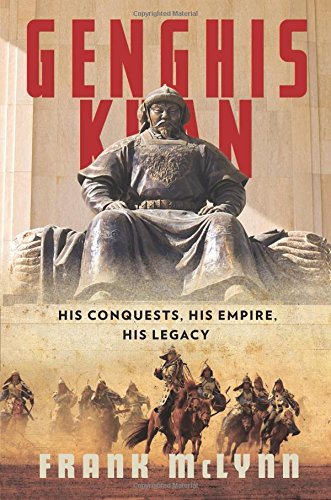
Genghis Khan
His Conquests, His Empire, His Legacy
کتاب های مرتبط
- اطلاعات
- نقد و بررسی
- دیدگاه کاربران
نقد و بررسی

May 18, 2015
Prolific British historian and biographer McLynn (Captain Cook) seeks to determine how a seemingly insignificant nomadic tribe from the remote, arid, sub-Arctic steppe became world conquerors. He relies heavily on The Secret History of the Mongols, an enigmatic Mongol hagiography, and on contemporary Arab and Persian authors who had their own evident biases. “The history of Genghis Khan and the Mongols can sometimes seem no more than an endless recital of massacres with pyramids of skulls,” McLynn writes, but he enlivens the litany of destruction with explorations of animal husbandry, traditional religion, and other anthropological topics—sections that are often more interesting than those recounting military exploits. Mongol diplomatic strategy
also bears recounting, particularly the drinking binges forced upon Song dynasty envoys. Although the author exhibits a great deal of sympathy for his subject, his opinions on the Mongol nation are not particularly positive: “While the Mongols’ military achievements were stupendous, they were otherwise totally parasitic,” he notes. They also “produced no cultural artefacts... and did not even bake bread; they essentially relied on the captive craftsmen and experts for everything.” McLynn’s work is sweepingly ambitious and persistently intriguing, even if it is not always clear how reliable his sources may be. Maps & illus.

Starred review from May 15, 2015
A prolific historian, biographer, and journalist returns with a sanguinary and thorough account of "the greatest conqueror the world has ever known." McLynn (Captain Cook: Master of the Seas, 2011, etc.) knows the terrain and the times so well that he writes about 12th- and 13th-century history and culture as if it were yesterday. Throughout this intricately detailed text, the author pauses continually to explain relevant devices, personalities, political situations, and geography-all of this gives readers a chance to truly understand. (The author even includes a lengthy appendix on Mongol religion, which was "extraordinarily complex," as well as an immensely helpful "glossary of principal personalities.") McLynn recognizes that the historical sources must be constantly questioned and analyzed, as victors tend to inflate their victories and losers, to minimize and blame. The author begins with the geography of Mongolia. He then tells us what we know about the boyhood of Temujin (who would become Genghis Khan) and charts his rise as a warlord to the position of absolute leader. McLynn provides plenty of material about Mongol battlefield strategy and tactics (they loved the false retreat and the divide-and-conquer ploy; they valued swiftness and were masters of horsemanship) as well as gruesome details about the fates of their enemies. As the author describes repeatedly, the Mongols treated settlements that surrendered without resistance much more humanely than they did those that resisted. Resistance meant absolute slaughter-men, women, children-after, of course, an extended period of looting and raping. The killing was vicious; some warriors even slit open the bodies of pregnant women and removed their unborn. McLynn estimates that the Mongols killed millions of people in their ventures into China, Russia, Hungary, Poland, and elsewhere. Thoroughly researched, grim, grisly, and sometimes even grudgingly admiring.
COPYRIGHT(2015) Kirkus Reviews, ALL RIGHTS RESERVED.

June 15, 2015
At the outset, McLynn (Captain Cook; Marcus Aurelius: A Life) declares that an authoritative biography of the Mongol ruler Genghis Khan (1162-1227) is impossible, but that this project is an attempt to synthesize the relevant scholarship of the last 40 years written in the major European languages. To a large degree, McLynn succeeds in lifting the veil from Khan's early life, his rise to power, and his rule. Furthermore, the author adds depth to the narrative by discussing not only his subject's military strategies and campaigns but also by delving into the structure of Mongol society, the role of women, and the reorientation of the Mongols from factional tribalism to absolute devotion to the Khan. McLynn's scholarship is at times undermined by an overwhelming array of details that sidetrack the work and distract the reader--as when the book continues on for over 100 pages after Khan's death. VERDICT A richly complete account that will satisfy those history readers loving minutiae, while being perhaps too overstuffed with detail for more casual readers.--Chris Sauder, Round Rock P.L., TX
Copyright 2015 Library Journal, LLC Used with permission.

July 1, 2015
The Mongol Empire was the largest land-based empire in history. At its height, it extended from China to eastern Europe, dominating the Eurasian landmass. The founder, Temujin, later titled Genghis Khan, was undoubtedly a great war leader who managed to unite the numerous Mongol tribes into a devastating war machine. Yet, due to the paucity of reliable sources, much of what we know about his personal life and character relies on legend, speculation, and educated guesses. McLynn, the author of many biographies of historical figures, acknowledges that a truly definitive biography of Genghis is impossible. Still, this ambitious and massive effort offers some credible insights into the qualities of Genghis while providing an excellent chronicle of his military campaigns and conquests. Particularly interesting is McLynn's description of thirteenth-century Mongolia, with its incredibly complicated web of tribes, clans, and subclans. McLynn pays ample tribute to the skill of Genghis in uniting these groups, but he is also appalled at the man's addiction to violence and cruelty, which strikes the modern reader as psychopathic. This is an informative and admirable effort that is ideal for general readers.(Reprinted with permission of Booklist, copyright 2015, American Library Association.)

























دیدگاه کاربران